Austrian actor Oscar Marion (1894-1986) was a popular star of the German cinema in the silent era and the 1930s. During the 1940s and 1950s, he worked as a production manager.
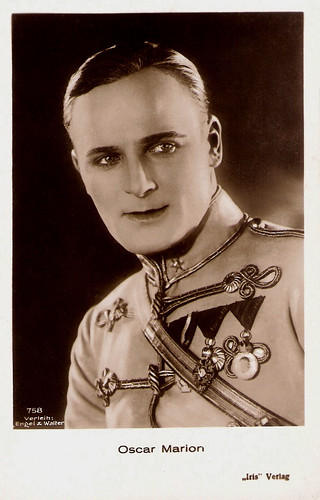
Austrian postcard by Iris Verlag, no. 758. Photo: Verleih Engel & Walter.
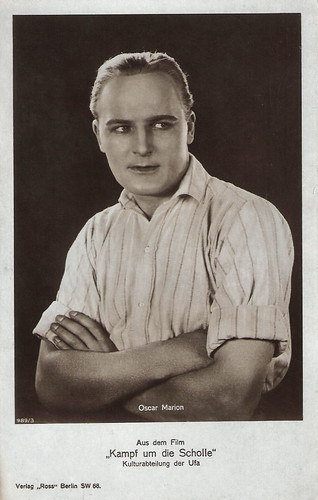
German postcard by Ross Verlag, no. 989/3, 1925-1926. Photo: Ufa. Publicity still for Kampf um die Scholle/Struggle for the Soil (Erich Waschneck, 1925).
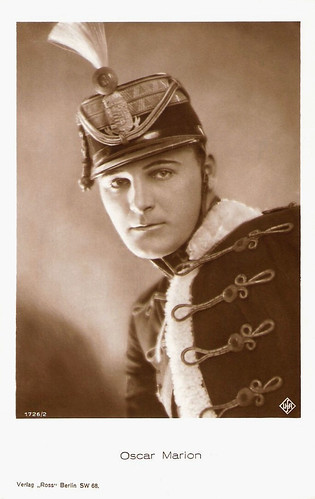
German postcard by Ross Verlag, no. 1726/2, 1927-1928. Photo: Ufa.
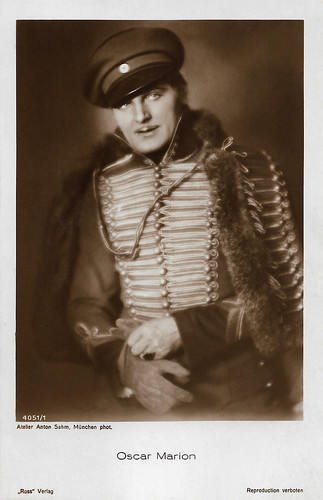
German postcard by Ross Verlag, no. 4051/1, 1929-1930. Photo: Atelier Anton Sahm, München (Munich). Publicity still for Waterloo (Karl Grune, 1929).
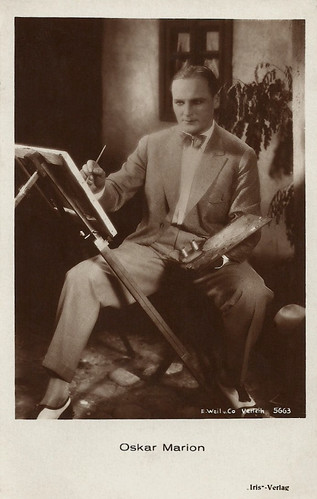
Austrian postcard by Iris Verlag, no. 5663. Photo: E. Weill & Co. Verleih.
Oscar Marion (aka Oskar Marion) was born as Oskar Lepka in Brünn in the Austrian-Hungarian Empire (now Brno, Czech Republic) in 1894. He studied Medicine in Vienna for some semesters and afterwards served as a sanitary during the First World War. After the war, he took acting lessons in Vienna and started a stage career at the Wiener Kammerspielen, later on also at the Stadttheater in Brünn and the Landestheater in Prague.
From there, he went to Berlin, where he performed in various theatres. From 1919, he was active as an actor in the German cinema, often playing the elegant lover and gentleman. In the first half of the 1920s, Marion played in countless films, with a record of 18 films in 1920.
Memorable titles are Die Schmugglerin/The Smuggler (Eugen Burg, 1920) with Wanda Treumann, Die Glücksfalle/The Lucky Chance (Arthur Wellin, 1920) with Lotte Neumann, the three-part serial Fortunato (Karl Halden, 1921) with Marion as the impostor Fortunato, Strandgut der Leidenschaft/Flotsam of Passion (Jaap Speyer, 1921), and Die rote Nacht/The Red Night (Jaap Speyer, 1921).
In 1922, he appeared in a.o. Die Männer der Frau Clarissa/The Men of Mrs. Clarissa (Fred Sauer, 1922), Die Frau mit den 10 Masken/The Woman with the Ten Masks (Siegfried Dessauer, 1922), Alexandra (Theo Frenkel, 1922) with Margit Barnay, Monna Vanna (Richard Eichberg, 1922) with Lee Parry, and Quarantäne/Quarantine (Max Mack, 1922) with Helena Makowska.
The next years followed such titles as Schande/Shame (Theo Frenkel, 1923) again with Makowska, Die Frau aus dem Orient/The Woman from the Orient (Wolfgang Neff, 1923) with Marion in the lead and Hedda Vernon co-starring, Taras Bulba (Vladimir Strizevskij, 1924) one of Taras Bulba’s sons with again Helena Makowska, Kampf um die Scholle/Struggle for the Soil (Erich Waschneck, 1925), and the part documentary part Science Fiction film Wunder der Schöpfung/Wonders of Creation (Hans Walter Kornblum, Rudolf Biebrach, Johannes Meyer, 1925).

German postcard by Ross Verlag, no. 700/9. Photo: Ufa. Publicity still for Kampf um die Scholle/Struggle for the Soil (Erich Waschneck, 1925) with Oskar Marion as Franz, the younger brother of estate owner Axel, who has an affair with Luise (Mary Parker), daughter of the estate manager Karl Marten (left; Otto Kronburger). The man behind Parker is Wilhelm Diegelmann, who plays Uncle Uhl. The man left is Otto Kronburger, who plays Luise's father, Karl Marten.

German postcard by Ross Verlag, Berlin, no. 76/2. Photo: Ufa. Liane Haid and Oscar Marion in Die Csardasfürstin/The Csardas Princess (Hanns Schwarz, 1927).
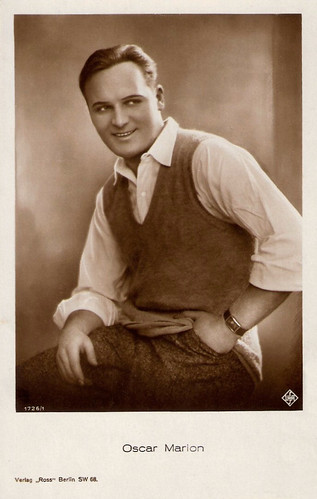
German postcard by Ross Verlag, no. 1726/1, 1927-1928. Photo: Ufa.
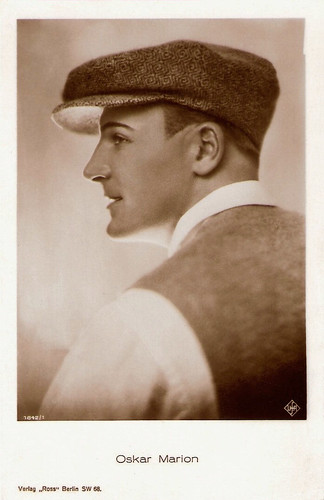
German postcard by Ross Verlag, no. 1642/1, 1927-1928. Photo: Ufa.
From the mid-1920s on, the number of films in which Oscar Marion acted yearly decreased, but not his reputation. He played in Fedora (Jean Manoussi, 1926) with Lee Parry, Mein Freund, der Chauffeur/My Friend, the Driver (Erich Waschneck, 1925), and Die kleine Inge und ihre drei Väter/Little Inge and her Three Fathers (Franz Osten, 1926).
In 1927, Marion played Prince Edwin in love with czardas dancer Sylva Varescu (Liane Haid) in Die Czardasfürstin/The Csardas Queen (Hanns Schwarz, 1927), while he acted again for Dutch director Jaap Speyer as the male lead in Valencia, Du schönste aller Rosen/Valencia, You the Most Beautiful of All Roses (Jaap Speyer, 1927) about a German in love with a Spanish flower seller (Maria Dalbaicin).
Next came films like Sturmflut/Storm tide (Willy Reiber, 1927), Hast du geliebt am schönen Rhein/If you have loved on the beautiful Rhine (James Bauer, 1927), Die Lindenwirtin am Rhein/The lime landlady on the Rhine (Rolf Randolf, 1927) with Maly Delschaft, while Marion had a minor part in the super production Waterloo (Karl Grune, 1928) and a larger part in Andreas Hofer (Hanns Prechtl, 1929), starring Fritz Greiner and again Mady Delschaft.
When the sound film came along, Marion worked in both the Czech cinema and the German cinema. In Czechoslovakia, he acted, for instance, in Dobry vojak Svejk/The Good Soldier Schwejk (1931) - the first sound film version of the adventures of Schwejk. In the sound era Marion also played in films such as Nie wieder Liebe/Never Love Again (Anatole Litvak, 1931) with Lilian Harvey, Henker, Frauen und Soldaten/Executioner, Women and Soldiers (Johannes Meyer, 1935) with Hans Albers, and Fridericus (Johannes Meyer, 1936) with Otto Gebühr. Marion’s parts had become much smaller during the 1930s, though. From 1936 to 1937, he worked as an assistant director, alongside his acting. In 1940, he quit acting altogether and became production manager and producer at Bavaria Film.
After the war, Marion worked as a production manager for various Munich based film companies, such as Eva-Film for which he produced the successful films Rosen-Resli (Harald Reinl, 1954), which turned Christine Kaufmann into a new child star, and Der schweigende Engel/The Silent Angel (Harald Reinl, 1954), again with Kaufmann in the lead. A few years later, Marion stopped his film career. His last productions were Solange du lebst/As Long as You Live (Harald Reinl, 1955) with Marianne Koch, and Ein Sommer, den man nie vergißt/A Summer You Will Never Forget (Werner Jacobs, 1959). Oscar Marion died in Munich in 1986, at the high age of almost 90 years.
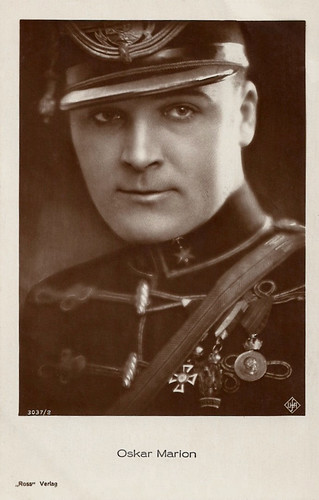
German postcard by Ross Verlag, no. 3037/2, 1928-1929. Photo: Ufa.
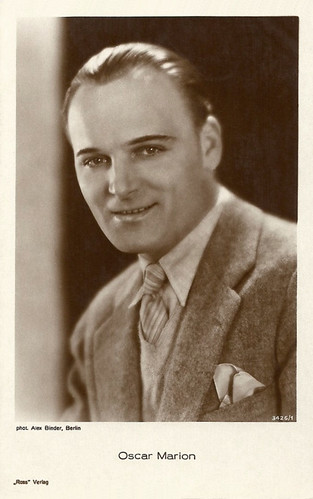
German postcard by Ross Verlag, no. 3426/1, 1928-1929. Photo: Alex Binder, Berlin.
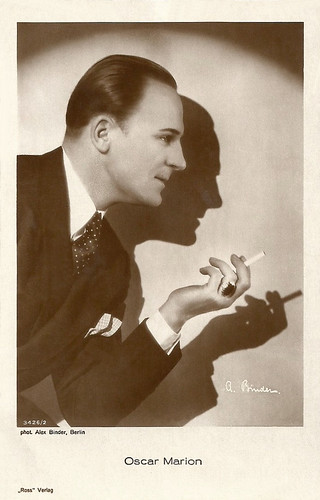
German postcard by Ross Verlag, no. 3426/2, 1928-1929. Photo: Alex Binder, Berlin.
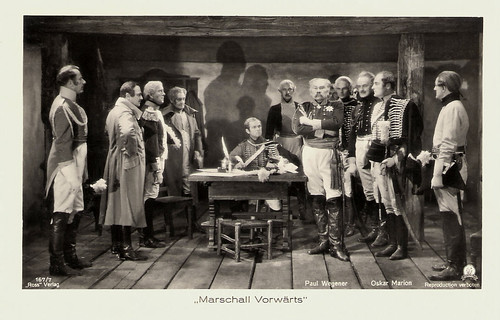
German postcard by Ross Verlag, no. 167/7. Photo: Biograph-Film. Publicity still for Marschall Vorwärts/Marshall Forward (Heinz Paul, 1932) with Paul Wegener.
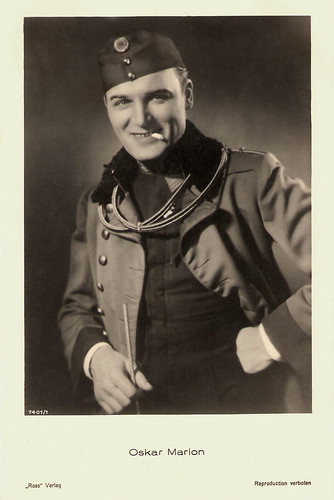
German postcard by Ross Verlag, no. 7401/1, 1932-1933.
Sources: Thomas Staedeli (Cyranos), Filmportal.de, Wikipedia (German), and IMDb.
This post was last updated on 10 May 2025.

Austrian postcard by Iris Verlag, no. 758. Photo: Verleih Engel & Walter.

German postcard by Ross Verlag, no. 989/3, 1925-1926. Photo: Ufa. Publicity still for Kampf um die Scholle/Struggle for the Soil (Erich Waschneck, 1925).

German postcard by Ross Verlag, no. 1726/2, 1927-1928. Photo: Ufa.

German postcard by Ross Verlag, no. 4051/1, 1929-1930. Photo: Atelier Anton Sahm, München (Munich). Publicity still for Waterloo (Karl Grune, 1929).

Austrian postcard by Iris Verlag, no. 5663. Photo: E. Weill & Co. Verleih.
Elegant Lover
Oscar Marion (aka Oskar Marion) was born as Oskar Lepka in Brünn in the Austrian-Hungarian Empire (now Brno, Czech Republic) in 1894. He studied Medicine in Vienna for some semesters and afterwards served as a sanitary during the First World War. After the war, he took acting lessons in Vienna and started a stage career at the Wiener Kammerspielen, later on also at the Stadttheater in Brünn and the Landestheater in Prague.
From there, he went to Berlin, where he performed in various theatres. From 1919, he was active as an actor in the German cinema, often playing the elegant lover and gentleman. In the first half of the 1920s, Marion played in countless films, with a record of 18 films in 1920.
Memorable titles are Die Schmugglerin/The Smuggler (Eugen Burg, 1920) with Wanda Treumann, Die Glücksfalle/The Lucky Chance (Arthur Wellin, 1920) with Lotte Neumann, the three-part serial Fortunato (Karl Halden, 1921) with Marion as the impostor Fortunato, Strandgut der Leidenschaft/Flotsam of Passion (Jaap Speyer, 1921), and Die rote Nacht/The Red Night (Jaap Speyer, 1921).
In 1922, he appeared in a.o. Die Männer der Frau Clarissa/The Men of Mrs. Clarissa (Fred Sauer, 1922), Die Frau mit den 10 Masken/The Woman with the Ten Masks (Siegfried Dessauer, 1922), Alexandra (Theo Frenkel, 1922) with Margit Barnay, Monna Vanna (Richard Eichberg, 1922) with Lee Parry, and Quarantäne/Quarantine (Max Mack, 1922) with Helena Makowska.
The next years followed such titles as Schande/Shame (Theo Frenkel, 1923) again with Makowska, Die Frau aus dem Orient/The Woman from the Orient (Wolfgang Neff, 1923) with Marion in the lead and Hedda Vernon co-starring, Taras Bulba (Vladimir Strizevskij, 1924) one of Taras Bulba’s sons with again Helena Makowska, Kampf um die Scholle/Struggle for the Soil (Erich Waschneck, 1925), and the part documentary part Science Fiction film Wunder der Schöpfung/Wonders of Creation (Hans Walter Kornblum, Rudolf Biebrach, Johannes Meyer, 1925).

German postcard by Ross Verlag, no. 700/9. Photo: Ufa. Publicity still for Kampf um die Scholle/Struggle for the Soil (Erich Waschneck, 1925) with Oskar Marion as Franz, the younger brother of estate owner Axel, who has an affair with Luise (Mary Parker), daughter of the estate manager Karl Marten (left; Otto Kronburger). The man behind Parker is Wilhelm Diegelmann, who plays Uncle Uhl. The man left is Otto Kronburger, who plays Luise's father, Karl Marten.

German postcard by Ross Verlag, Berlin, no. 76/2. Photo: Ufa. Liane Haid and Oscar Marion in Die Csardasfürstin/The Csardas Princess (Hanns Schwarz, 1927).

German postcard by Ross Verlag, no. 1726/1, 1927-1928. Photo: Ufa.

German postcard by Ross Verlag, no. 1642/1, 1927-1928. Photo: Ufa.
Super production
From the mid-1920s on, the number of films in which Oscar Marion acted yearly decreased, but not his reputation. He played in Fedora (Jean Manoussi, 1926) with Lee Parry, Mein Freund, der Chauffeur/My Friend, the Driver (Erich Waschneck, 1925), and Die kleine Inge und ihre drei Väter/Little Inge and her Three Fathers (Franz Osten, 1926).
In 1927, Marion played Prince Edwin in love with czardas dancer Sylva Varescu (Liane Haid) in Die Czardasfürstin/The Csardas Queen (Hanns Schwarz, 1927), while he acted again for Dutch director Jaap Speyer as the male lead in Valencia, Du schönste aller Rosen/Valencia, You the Most Beautiful of All Roses (Jaap Speyer, 1927) about a German in love with a Spanish flower seller (Maria Dalbaicin).
Next came films like Sturmflut/Storm tide (Willy Reiber, 1927), Hast du geliebt am schönen Rhein/If you have loved on the beautiful Rhine (James Bauer, 1927), Die Lindenwirtin am Rhein/The lime landlady on the Rhine (Rolf Randolf, 1927) with Maly Delschaft, while Marion had a minor part in the super production Waterloo (Karl Grune, 1928) and a larger part in Andreas Hofer (Hanns Prechtl, 1929), starring Fritz Greiner and again Mady Delschaft.
When the sound film came along, Marion worked in both the Czech cinema and the German cinema. In Czechoslovakia, he acted, for instance, in Dobry vojak Svejk/The Good Soldier Schwejk (1931) - the first sound film version of the adventures of Schwejk. In the sound era Marion also played in films such as Nie wieder Liebe/Never Love Again (Anatole Litvak, 1931) with Lilian Harvey, Henker, Frauen und Soldaten/Executioner, Women and Soldiers (Johannes Meyer, 1935) with Hans Albers, and Fridericus (Johannes Meyer, 1936) with Otto Gebühr. Marion’s parts had become much smaller during the 1930s, though. From 1936 to 1937, he worked as an assistant director, alongside his acting. In 1940, he quit acting altogether and became production manager and producer at Bavaria Film.
After the war, Marion worked as a production manager for various Munich based film companies, such as Eva-Film for which he produced the successful films Rosen-Resli (Harald Reinl, 1954), which turned Christine Kaufmann into a new child star, and Der schweigende Engel/The Silent Angel (Harald Reinl, 1954), again with Kaufmann in the lead. A few years later, Marion stopped his film career. His last productions were Solange du lebst/As Long as You Live (Harald Reinl, 1955) with Marianne Koch, and Ein Sommer, den man nie vergißt/A Summer You Will Never Forget (Werner Jacobs, 1959). Oscar Marion died in Munich in 1986, at the high age of almost 90 years.

German postcard by Ross Verlag, no. 3037/2, 1928-1929. Photo: Ufa.

German postcard by Ross Verlag, no. 3426/1, 1928-1929. Photo: Alex Binder, Berlin.

German postcard by Ross Verlag, no. 3426/2, 1928-1929. Photo: Alex Binder, Berlin.

German postcard by Ross Verlag, no. 167/7. Photo: Biograph-Film. Publicity still for Marschall Vorwärts/Marshall Forward (Heinz Paul, 1932) with Paul Wegener.

German postcard by Ross Verlag, no. 7401/1, 1932-1933.
Sources: Thomas Staedeli (Cyranos), Filmportal.de, Wikipedia (German), and IMDb.
This post was last updated on 10 May 2025.
No comments:
Post a Comment